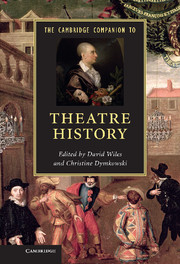6 - Liverpool
from Part III - Where?
Published online by Cambridge University Press: 05 February 2013
Summary
In 2004, Marvin Carlson asked what was the single most important thing we could do to bring theatre history into the new millennium. His answer was simple: ‘Become Less Provincial’. His argument, that theatre history must broaden its remit both in terms of forms and of geographical reach, seems an obvious one in an increasingly global world, one in which perspectives have sometimes been very limited. But in lifting our heads upwards and outwards, there have been consequences. The local, never a very fashionable concept for mainstream historians, has become increasingly marginalised. It could be argued that we have found ‘new locals’, as the authors of Theatre Histories might claim in a book that covers not only performance from Western traditions (including late-Neolithic ritual pilgrimage), but also Bunraku from Japan, social drama from Kerala in India, and Gao Xingjian’s Wild Man from post-Cultural Revolution China. Whilst this approach does allow for neglected areas of theatre and performance to be considered, there is also a danger that the ‘old locals’, i.e., Western ‘provincial’ theatre (in particular that based in theatre buildings), become increasingly marginalised. This neglect is further compounded by the increasing concerns to widen the events we encompass in our consideration of performance. Here, Theatre Histories includes cultural performances such as tourism and Times Square, shamanism and ritual and urban carnivals. At the same time, the old binary of the metropolitan and the local is still very much in evidence. Michael Billington’s The State of the Nation: British Theatre Since 1945, for example, a book that claims to explore the pattern and shape of British theatre (my emphasis) since the end of the Second World War is in essence a book about theatre in the capital. He does include two short sections on regional theatre, one in a chapter called ‘Scenes from an Execution’, the very title of which sums up a pervading and sweeping perception of theatre outside of London: it is either in crisis or facing closure. The generalised view of the repertoire of regional theatre is summed up in another history that offers us very few real clues about the local outside of London, Simon Shepherd’s Modern British Theatre, which talks about the sense of repertory theatres’ staleness in the 1980s when ‘a rash of musicals and modern classics followed like a nasty infection’.
- Type
- Chapter
- Information
- The Cambridge Companion to Theatre History , pp. 91 - 103Publisher: Cambridge University PressPrint publication year: 2012
References
- 1
- Cited by

